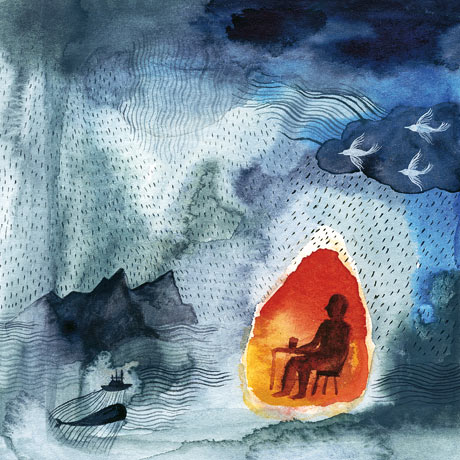
Early on in Herman Melville's Moby-Dick, the narrator – call him Ishmael – finds himself sharing a bed on a stormy Massachusetts night with the surprisingly friendly cannibal, Queequeg. The room, like the streets of the whaling town outside, is icy, but the bed is warm, prompting Ishmael to wax philosophical on the subject of cosiness: "We felt very nice and snug, the more so because it was so chilly… because truly to enjoy bodily warmth, some small part of you must be cold." If you're 100% comfortable, "you cannot be said to be comfortable any more. But if, like Queequeg and me in the bed, the tip of your nose or the crown of your head be slightly chilled, why then… you feel most delightfully and unmistakably warm. For this reason a sleeping apartment should never be furnished with a fire, which is one of the luxurious discomforts of the rich."
I'm writing this from a walking (and working) holiday in a small thatched cottage on the harshly gorgeous coastline of Donegal in Ireland, which is, one badly written guide informs us, a land of contrasts. This is the most criminally overused of travel writing cliches, but it's hard to deny it's appropriate here, and not solely because it sometimes rains for four hours a day and sometimes – contrastingly! – for eight. Fellow aficionados of holidays in barren, rainswept, empty places will know the contrasts I'm really referring to here. People of our persuasion understand that no tropical beach holiday, nor even a constantly stimulating city-break, can ever rival the contrast between a torrential cliff-top downpour and the subsequent Guinness by a roaring pub fire. The pinnacle of "deliciousness", as Ishmael puts it, "is to have nothing but the blanket" – or, you could add, the walls of a pub – "between you and your snugness and the cold of the outer air. Then there you lie like the one warm spark in the heart of an arctic crystal."
There's a broader point about happiness here which, were I an author of mega-bestselling "big idea" books, I might feel compelled to label the Ishmael Effect. We strive to improve our circumstances, envisaging some endpoint of unbroken pleasure, without heeding Melville's warning that "there is no quality in this world that is not what it is merely by contrast". The lives we think we'd love, lacking contrast, would be full of "the luxurious discomforts of the rich". Warmth is only warmth by comparison with cold; excitement's only exciting in contrast to boredom. The other night, my girlfriend and I arrived at a tiny pub to find a man singing and playing the guitar. A guitar! After two days of almost no contact with other humans, this was almost indescribably thrilling.
I should apologise for the absence of psychological studies or interviews to back up my arguments here, but I'm afraid it's a substantial drive to the nearest village that has mobile reception or internet access. This isolation has proved both pleasurable and, in work terms, productive. (Cal Newport, author of the academic blog Study Hacks, recommends that students try "adventure studying", working in isolated contexts to provide both psychic refreshment and freedom from daily distractions.) But I bet both the pleasure and productivity would fade if I stayed much longer: they're products solely of the contrast with my usual urban immersion. By the day after tomorrow, I fully expect to be getting nostalgic for traffic jams.
oliver.burkeman@theguardian.com; twitter.com/oliverburkeman

